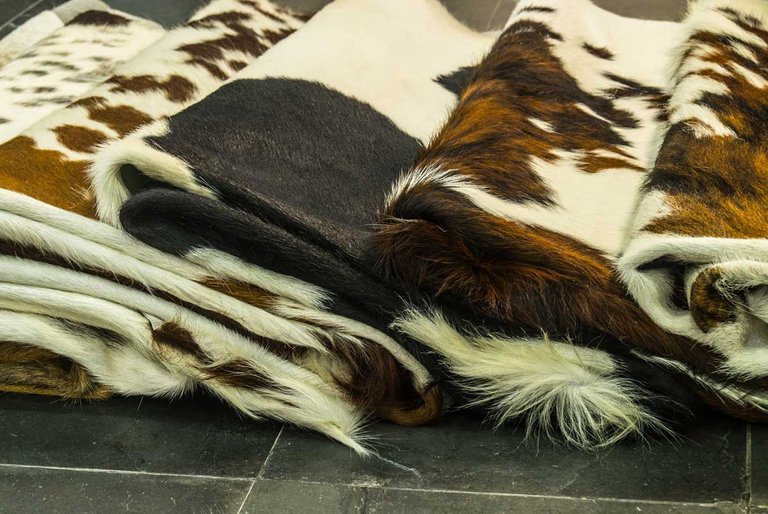By-products derived from farm animals include hides and skin, fur, wool, feathers, horns, milk, eggs, meat, tail of animal, bone, blood and manure (dung).
HIDES & SKIN
Hides and skin: Hides and skin are derived from the skin of cattle, sheep, goat, pig and rabbit.
Economic Importance of Hides and Skin
(i) Hides and skin are processed into leather for the manufacture of bags, shoes, ropes and foot wears.
(II) They serve as source of income to farmers.
(iii) They can be processed into meat, e.g. pormon.
(iv) They are used in clothing materials, such as jacket.
(v) They are also used as ornamentals and other decorative household materials.
Wool and Fur: Wool is the hair derived from sheep while fur hair derived from rabbit. These produce are found on the body of these farm animals.
Economic Importance of Wool and Fur
(i) Wool is used for the manufacture of brushes.
(ii) It is also used as clothing material like jacket.
(iii) It can be used in the manufacturing of blankets and rugs.
HORNS, MILK & EGG
Horns: Horns are derived from animals like cattle, sheep and goat. They are found in the head region of these animals.
Economic Importance of Horns
(I) Horns are used industrially as raw materials in knife handles and belt heads.
(II) They are used for decorative purposes and as ornamentals.
(III) They can be used to make fertilizers because they are rich in calcium and phosphorus.
(IV) They are also used as feed for livestock because of high level of calcium and phosphorus.
(v) Some are used in music and other dance.
(vi) To the animals, they are used for lighting or defending themselves against enemies.
Milk: milk is derived from farm animals like cow (cattle), ewe (Sheep), sows (pigs) and doe (goat). The part which produces this milk is the mammary gland or udder. The milk can be extracted from the animals by milking manually (using hands) or mechanically (by the use of milking machines). The milk so derived from these animals can be made fit for consumption by man through a process called pasteurisation.
Economic Importance of Milk
(I) Milk ls a source of protein in food.
(II) It can be used in raising foster calves, lambs or children.
(III) It is used in the preparation of baby food.
(IV) It supplies minerals to livestock.
(V) It is used as extender in artificial insemination practices.
(Vi) It is used in the preparation of dairy products such as butter, cheese and yoghurt.
Eggs: Eggs are mainly produced by poultry birds such as white leghom, brown leghom and Rhode Island Red. Others are geese, turkey and guinea fowls.
Economic Importance of Egg
(1) Egg is a source of protein in human food or diet.
(ii) It is used in the manufacture of pharmaceuticals.
(iii) Egg is industrially processed and is used to make paints and vanishes or printer’s ink.
(iv) Egg is used in the production of adhesives.
(V) Egg shells are used in making scouring powder.
(Vi) Egg shell is a source of calcium in Poultry feed/animal feed.
(vii) Egg is used for reproduction .
(viii) It is also used for manufacturing of Vaccines.
(ix) It is used in cosmetics.
.jpg)

.jpg)
.jpg)
.jpg)
.jpg)
.jpg)